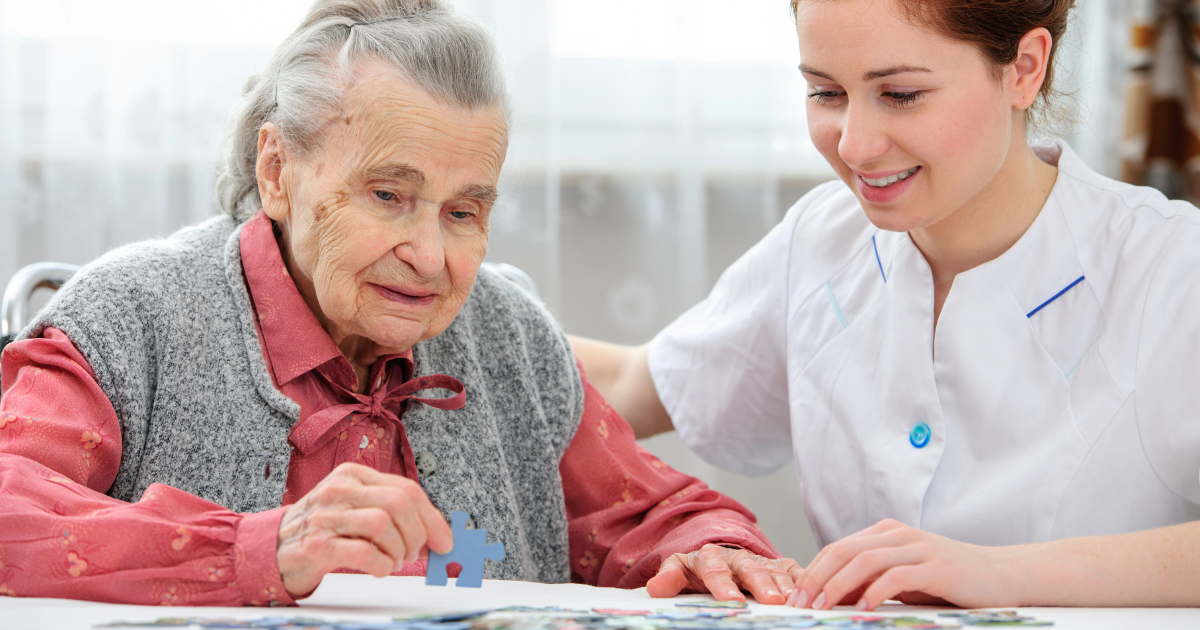When your loved one starts showing symptoms of dementia, finding help for dementia … help for them … needs to take top priority. People with dementia have unique needs, so it’s important that care staff have specialty training in dealing with dementia symptoms.
Understanding Dementia
Dementia is a progressive condition characterized by a decline in cognitive function. It affects a person’s memory, thinking, and behavior. And as dementia progresses, individuals may require increasing levels of assistance with daily activities.
That’s why finding the right help and support is essential for maintaining quality of life and ensuring safety for individuals living with dementia.
Common Help Needed for Dementia
Each individual with dementia has unique and individual needs. However, here are some of the most common types of help needed:
Night Care
Individuals with dementia may experience disturbances in sleep patterns, leading to confusion and agitation during the night. Night care services provide assistance and supervision during nighttime hours to ensure safety and comfort.
Wandering Management
It’s common for people with dementia to wander. This wandering behavior poses risks such as getting lost or encountering dangerous situations. Therefore, it’s important to employ wandering management strategies such as environmental modifications, supervision, and GPS tracking devices to prevent wandering and to ensure safety.
Dressing Assistance
Since dementia can cause difficulties with coordination, sequencing, and decision-making, it also can affect an individual’s ability to dress themselves independently. Dressing assistance services provide support with selecting appropriate clothing, fastening buttons, and putting on garments.
Eating and Meal Assistance
Individuals with dementia may experience challenges with eating, including difficulty with utensils, swallowing, and maintaining proper nutrition. Meal assistance services offer support with meal preparation, feeding assistance, and monitoring nutritional intake.
Personal Hygiene and Bathing
Dementia also can impact personal hygiene routines, which can lead to difficulties with bathing, grooming, and toileting. Personal hygiene assistance services provide help with bathing, dressing, oral care, and toileting to maintain hygiene and prevent infections.
Medication Management
Memory loss and confusion in dementia may result in difficulty managing medications independently. Medication management services involve organizing medications, reminding individuals to take them, and monitoring for side effects or missed doses.
Cognitive Stimulation
Cognitive stimulation activities are essential for maintaining cognitive function and promoting engagement and social interaction. Programs such as memory games, puzzles, and reminiscence therapy provide mental stimulation and support overall brain health.
Emotional Support and Companionship
Individuals with dementia may experience feelings of loneliness, anxiety, and depression. Emotional support and companionship services offer socialization, conversation, and companionship to improve mood and well-being.
Steps to Take in Finding Help for Dementia
Here are the steps you can take in finding help for your loved one with dementia:
-
Consult with Healthcare Professionals
Start by consulting with healthcare professionals, such as doctors, neurologists, and social workers, to assess the individual’s needs and develop a comprehensive care plan.
-
Research Local Resources and Services
Research local resources and services available for dementia care, including home care agencies, adult day programs, adult family homes, memory care communities, and support groups.
-
Evaluate In-Home Care Services
In-home care services provide personalized assistance and support in the comfort of the individual’s own home. Evaluate the range of services offered, including personal care, medication management, and companionship.
-
Consider a Residential Adult Family Home
An adult family home combines the comfort of a residential home setting with 24/7 onsite care and the community of other residents. The range of services can encompass all of the common help needed with dementia listed above. Tour local homes to find one that is the right fit.
-
Explore Memory Care Communities
As the disease progresses, some people with dementia need higher levels of care. Memory care communities offer specialized care and support for individuals with dementia in a secure and structured environment. Tour different communities to assess the level of care, amenities, and programming offered.
-
Seek Support from Family and Friends
Reach out to family members, friends, and community support groups for assistance and emotional support. Caregiving for a loved one with dementia can be challenging, and having a support network is invaluable.
-
Continuously Evaluate and Adjust Care Needs
As dementia progresses, the individual’s care needs may change. Continuously evaluate and adjust the level of care and support to ensure it meets the individual’s evolving needs and preferences.
Don’t Delay in Finding Help for Dementia
Finding help for dementia involves a combination of professional services, community resources, and support networks. It can take some time to find the right care for your loved one, so don’t delay getting started.
Dementia is devastating to live with. But by addressing the individual’s specific needs and preferences, families can provide the necessary support and enhance the quality of life for their loved one living with dementia.
When you’re ready to consider a residential adult family home as part of your care solution, we invite you to stop by Crest View Adult Family Home for a cup of coffee and a tour. Click here to schedule a visit.






